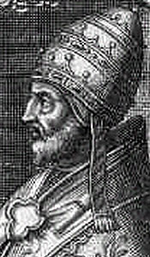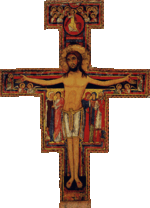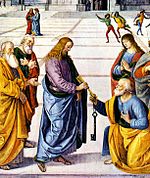- Pope Adrian V
-
Adrian V 
Papacy began 11 July 1276 Papacy ended 18 August 1276 Predecessor Innocent V Successor John XXI Personal details Birth name Ottobuono de' Fieschi Born c. 1210–1220
Genoa, Republic of Genoa, Holy Roman EmpireDied 18 August 1276
Viterbo, Papal States, Holy Roman EmpireOther Popes named Adrian Papal styles of
Pope Adrian V
Reference style His Holiness Spoken style Your Holiness Religious style Holy Father Posthumous style None Pope Adrian V (c. 1210/20 – 18 August 1276), born Ottobuono de' Fieschi, was pope in 1276.
Biography
Ottobuono belonged to a feudal family of Liguria, the Fieschi, Counts of Lavagna.
His first clerical position came in 1243, when he was created a papal chaplain. Subsequently he received several ecclesiestical benefices, becoming archdeacon in Bologna (1244) and Parma (1244/48–1255), canon and chancellor of the cathedral chapter in Reims (1243–1250), canon and dean of the chapter in Piacenza (ca. 1247) and canon of the cathedral chapter in Paris (1244/45–1270). In December 1251, he was created Cardinal Deacon of San Adriano by his uncle Pope Innocent IV (1243–54). He was also archpriest of the patriarchal Liberian Basilica (attested from 1262).
He was sent to England in 1265 by Pope Clement IV (1265–68) to mediate between Henry III of England (1216–72) and his barons, and to preach the Crusades; he remained there for several years as the papal legate, serving from October 1265 to July 1268. His diplomatic position was such that his name is still on the oldest extant piece of English statute law, the Statute of Marlborough of 1267, where the formal title mentions as a witness "the Lord Ottobon, at that time legate in England". (Also on this legation was a young diplomat, the future Boniface VIII.) In April 1268 he issued a set of canons, which formed the basis of church law in England until the reformation of the sixteenth century.
Under the influence of Charles of Anjou, he was elected pope to succeed Innocent V on 12 July 1276 but died at Viterbo on 18 August 1276 from illness without ever having been ordained to the priesthood; he is buried there in the church of S. Francesco. Technically, since Adrian V was never ordained bishop, he never truly became the Bishop of Rome, but traditionally he is counted in the papal succession. Adrian V was the third pope in "The Year of Four Popes" of 1276.
He achieved little during his time as pope; he annulled Pope Gregory X's (1271–76) bull on the holding of papal conclaves, but died before enacting new regulations.
His funerary monument, attributed to Arnolfo di Cambio, is in the church of San Francesco alla Rocca at Viterbo.
Popular Culture
In the Divine Comedy, Dante meets Adrian's spirit in Purgatory, on the level reserved for the avaricious, where Adrian is atoning for his sin of worldly ambition.
References
 "Pope Adrian V" in the 1913 Catholic Encyclopedia.
"Pope Adrian V" in the 1913 Catholic Encyclopedia.- Maxwell-Stuart, P. G. Chronicle of the Popes: The Reign-by-Reign Record of the Papacy from St. Peter to the Present, Thames & Hudson, 2002, p. 117–118. ISBN 0500017980.
- A. Paravicini Bagliani, Cardinali di curia e familiae cardinalizie dal 1227 al 1254, Padova 1972, p. 358–365
Catholic Church titles Preceded by
Innocent VPope
1276Succeeded by
John XXICatholic Church Organizations, Papacy, Teachings and Liturgical TraditionsHistory Jesus · Twelve Apostles · Early Christianity · History of the Papacy · Ecumenical Councils · Missions · Great Schism of East · Crusades · Great Schism of West · Protestant Reformation · Counter-Reformation · Catholic Church by country
Hierarchy Pope · Cardinals · Patriarchs · Major Archbishops · Primates · Metropolitans · Archbishops · Diocesan BishopsTheology Sacraments Mariology Doctors of
the ChurchAlbertus Magnus · Ambrose · Anselm of Canterbury · Anthony of Padua · Thomas Aquinas · Athanasius of Alexandria · Augustine of Hippo · Basil of Caesarea · Bede · Robert Bellarmine · Bernard of Clairvaux · Bonaventure · Petrus Canisius · Catherine of Siena · Peter Chrysologus · John Chrysostom · Cyril of Alexandria · Cyril of Jerusalem · Peter Damian · Ephrem the Syrian · Francis de Sales · Gregory of Nazianzus · Gregory the Great · Hilary of Poitiers · Isidore of Seville · Jerome · John of Damascus · John of the Cross · Lawrence of Brindisi · Leo the Great · Alphonsus Maria de Liguori · Teresa of Ávila · Thérèse of LisieuxPope Benedict XVI Preceding Popes Orders and
SocietiesVatican II Particular Churches
sorted by
Liturgical TraditionsAlexandrian · Coptic · Ethiopic · Antiochian · Maronite · Syriac · Syro-Malankara · Armenian · Armenian · Byzantine · Albanian · Belarusian · Bulgarian · Croatian · Greek · Hungarian · Italo-Albanian · Macedonian · Melkite · Romanian · Russian · Ruthenian · Slovak · Ukrainian · East Syrian · Chaldean · Syro-Malabar · Latin · Roman · Anglican Use · Sarum · Ambrosian · MozarabicHistory of the Catholic Church General History of the Catholic Church · History of the Papacy · History of the Roman Curia · Catholic Ecumenical Councils · Timeline of the Catholic Church · History of Christianity · Role of the Catholic Church in Western civilization · Art in Roman Catholicism · Catholic religious order · Christian monasticism · Papal States
Church beginnings Constantine the Great to
Pope Gregory IConstantine the Great and Christianity · Arianism · Basilica of St. John Lateran · First Council of Nicaea · Pope Sylvester I · First Council of Constantinople · Biblical canon · Jerome · Vulgate · First Council of Ephesus · Council of Chalcedon · Benedict of Nursia · Second Council of Constantinople · Pope Gregory I · Gregorian chant
Early Middle Ages Third Council of Constantinople · Saint Boniface · Byzantine Iconoclasm · Second Council of Nicaea · Charlemagne · Pope Leo III · Fourth Council of Constantinople · East–West Schism
High Middle Ages Pope Urban II · Investiture Controversy · Crusades · First Council of the Lateran · Second Council of the Lateran · Third Council of the Lateran · Pope Innocent III · Latin Empire · Francis of Assisi · Fourth Council of the Lateran · Inquisition · First Council of Lyon · Second Council of Lyon · Bernard of Clairvaux · Thomas Aquinas
Late Middle Ages Protestant Reformation/
Counter-ReformationBaroque Period to the
French Revolution19th century Pope Pius VII · Pope Pius IX · Dogma of the Immaculate Conception of the Virgin Mary · Our Lady of La Salette · Our Lady of Lourdes · First Vatican Council · Papal infallibility · Pope Leo XIII · Mary of the Divine Heart · Prayer of Consecration to the Sacred Heart · Rerum Novarum
20th century Pope Pius X · Our Lady of Fátima · Persecutions of the Catholic Church and Pius XII · Pope Pius XII · Pope Pius XII Consecration to the Immaculate Heart of Mary · Dogma of the Assumption of the Virgin Mary · Pope John XXIII · Second Vatican Council · Pope Paul VI · Pope John Paul I · Pope John Paul II
21st century By country or region Brazil · Cuba · France · Germany · Hispano-America · Ireland · Japan · Mexico · Spain · United States · Venezuela
Categories:- Popes
- Italian popes
- 13th-century Italian people
- Diplomats of the Holy See
- People from Genoa (city)
- 1210s births
- 1276 deaths
- Cardinal-nephews
- 13th-century Roman Catholic archbishops
- Viterbo Papacy
Wikimedia Foundation. 2010.


